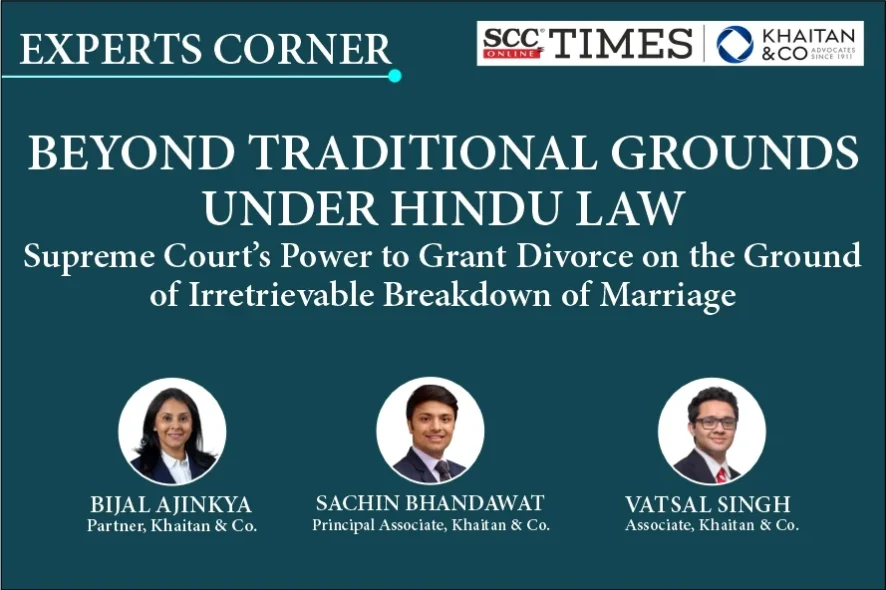Hindu marriages and divorces in India are governed by the Hindu Marriage Act, 1955 (HMA) and in some special circumstances, by the Special Marriage Act, 1954 (SMA). At times, marriages undergo an irretrievable breakdown leading to situations where the parties may not wish to continue the relationship as married parties.
Irretrievable breakdown of marriage is a marriage beyond repair. In such a scenario, the parties have been living apart for several years or are no longer willing or able to live together and have no prospects of a successful marital relationship. Therefore, it is a marriage which exists only in the eyes of the law and not in reality.
Irretrievable breakdown of marriage is considered as a ground for dissolution of marriage in several countries but is not a ground available under the HMA/SMA. The Law Commission of India in its 71st Report (1978) considered the question of whether the HMA should be amended to make it a ground. Its recommendation was to insert a new section into the HMA. Further, the Supreme Court of India in Naveen Kohli v. Neelu Kohli1, while referring to the 71st Report of the Law Commission of India, recommended to the Union of India to consider bringing such an amendment into the HMA.
Supreme Court’s powers under Article 142
As the grounds for divorce under the HMA and SMA are exhaustive, a divorce on the grounds of an irretrievable breakdown of marriage cannot be granted in the absence of an enabling legislative provision.
Article 142 of the Indian Constitution allows the Supreme Court of India to exercise its jurisdiction where it is necessary to do complete justice. The Supreme Court of India has, time and again, granted divorce on the ground of irretrievable breakdown of marriage.
The Supreme Court of India in Shilpa Sailesh v. Varun Sreenivasan2, has explained the scope and nature of its powers under Article 142.
The five-Judge Constitution Bench has laid down that the power under Article 142 can be exercised to grant divorce in cases of irretrievable breakdown of marriage. The Supreme Court of India has clarified that Article 142 does not confer a right of divorce on the parties if the marriage has broken down, rather it is a matter of discretion that only the Supreme Court can exercise by analysing the various factors. These factors may include the period of separation, the nature of allegation made by the parties, how many times the courts have intervened, etc.
Exercise of power by the Supreme Court of India
In the recent case of Rajib Kumar Roy v. Sushmita Saha3, the Supreme Court granted divorce as “continued bitterness, dead emotions and long separation”, in the given facts and circumstances of the case, tantamount to irretrievable breakdown of marriage.
Similarly, in Poonam v. Surender Kumar4 ,the Supreme Court observed that since the parties were living apart for more than 19 (nineteen) years, they were not able to subserve the very objective of marriage i.e. companionship for each other. Hence, divorce was granted on the ground of irretrievable breakdown of marriage.
However, the Supreme Court has also warned against a hard and fast approach. In the recent case of Nirmal Singh Panesar v. Paramjit Kaur Panesar5, the Supreme Court declined to grant relief on this ground as the wife was ready and willing to undertake her obligations under the marriage. In Delma Lubna Coelho v. Edmond Clint Fernandes6, the Supreme Court noted, “We do not find this to be a fit case for exercise of power under Article 142 as good sense may prevail on the parties. They had lived together only for 40 days.”
In effect, the Supreme Court of India has not provided for a straitjacket formula, rather they exercise the power under Article 142 on a case-by-case basis. Further, as the power under Article 142 is discretionary, the Supreme Court may reject the relief of divorce.
Concluding remarks
The Supreme Court’s approach in granting divorce on the ground of irretrievable breakdown of marriage, despite the absence of statutory provisions in the HMA or the SMA, reflects a nuanced and pragmatic understanding of the evolving nature of family law. Moreover, in navigating the complexities of irretrievable breakdown of marriages, the Supreme Court has demonstrated a commitment to a case-by-case analysis, avoiding rigid formulas and underscoring the need for a careful exercise of judicial discretion. Therefore, the Supreme Court’s cautious role in addressing the challenges posed by irretrievable breakdowns of marriages remains pivotal in shaping family law jurisprudence in India. Furthermore, this goes on to show that marriages under the HMA and SMA are still considered as a sacred union, which can be declared irretrievable only by the highest court of the country.
†Partner, Khaitan & Co.
††Principal Associate, Khaitan & Co.
†††Associate, Khaitan & Co.
4. Civil Appeal No. 5195/2022






